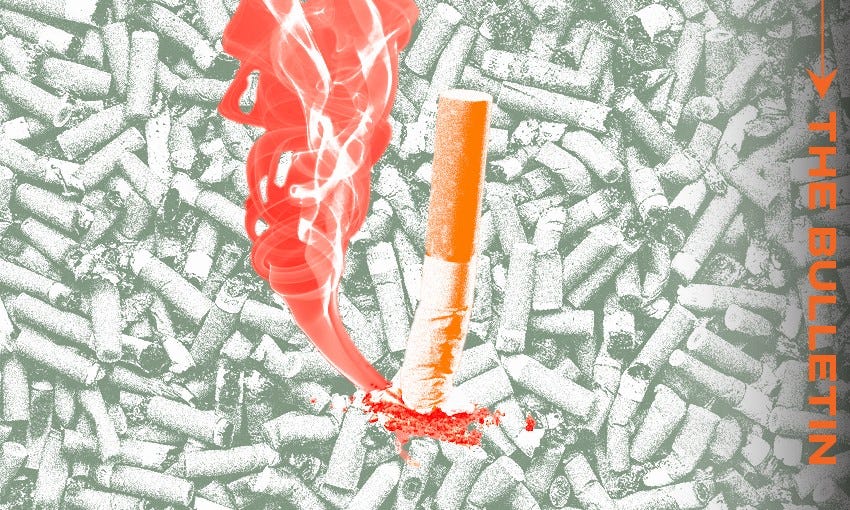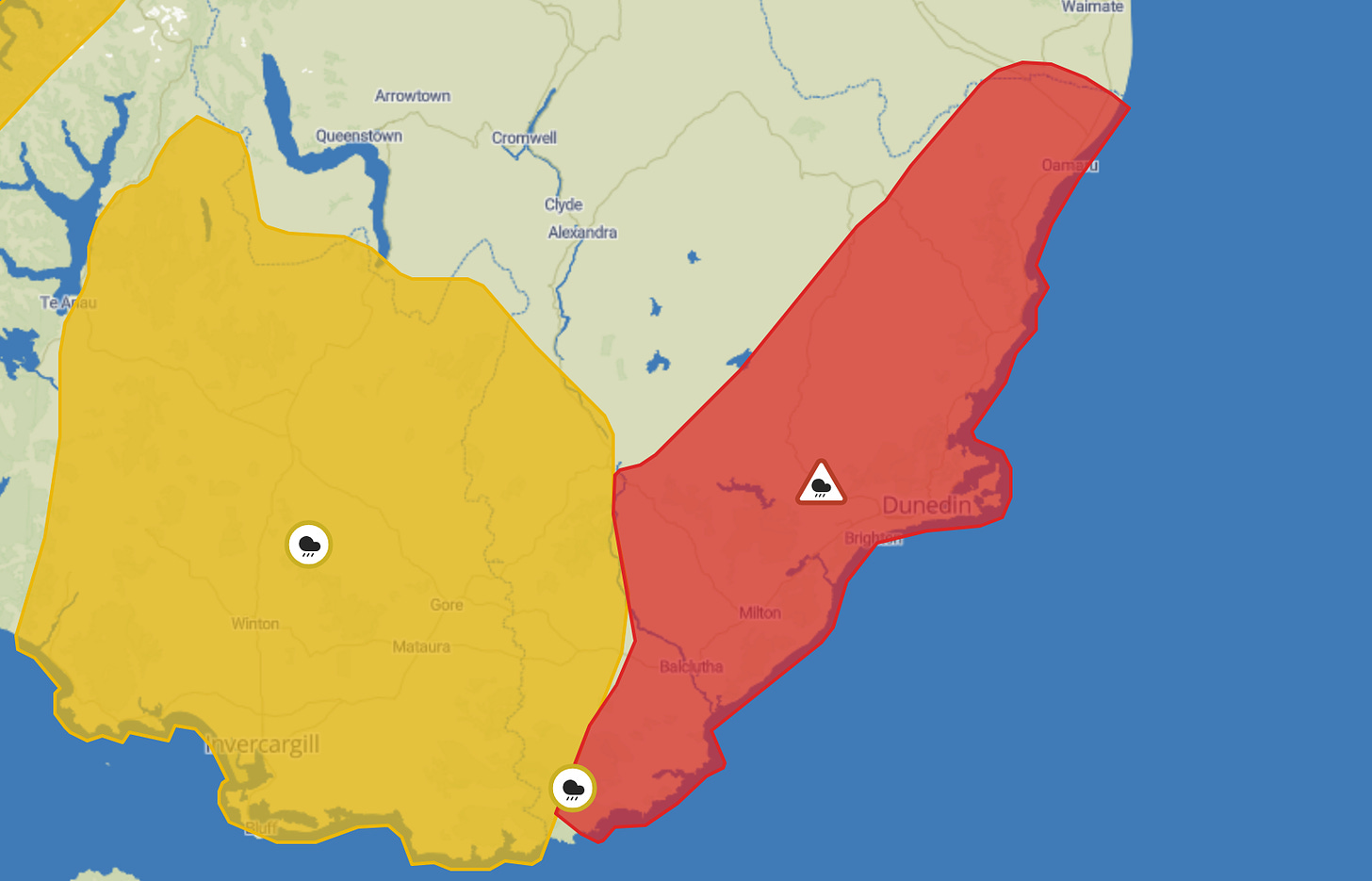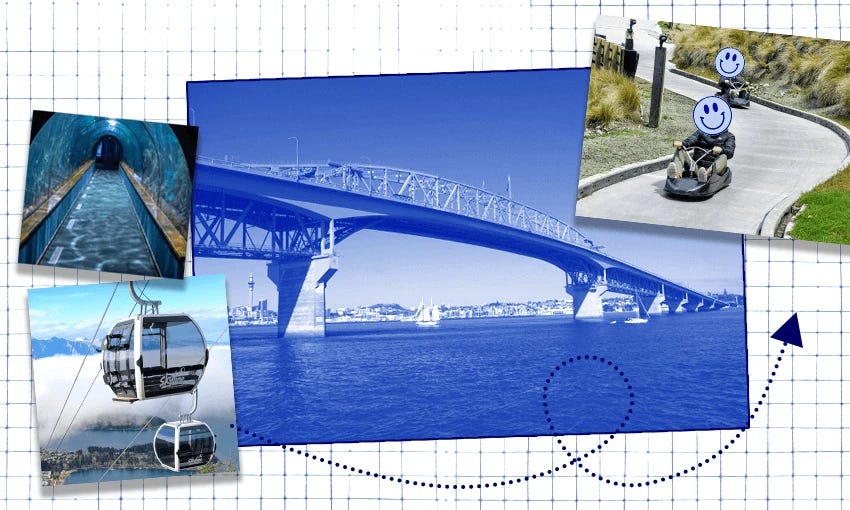The lives that could be saved by creating a 'smokefree generation'
Plus: A state of emergency has been declared in Dunedin after heavy rainfall overnight.
Mōrena, and welcome to The Bulletin for Friday, October 4.
In today’s edition: A state of emergency has been declared in Dunedin with about 70 people self-evacuating due to flooding, the government is poised to unveil a new plan to underwrite construction of new private houses, and should the Reserve Bank go harder and faster with its cuts to the official cash rate? But first, global research shines a light on the possible consequences of the government’s move to wind back anti-smoking legislation.
Over a million lives on the line
New research has suggested that 1.2 million deaths from lung cancer could be prevented around the world if the purchase of cigarettes and other tobacco products was banned for people born between 2006 and 2010. Published in the Lancet journal yesterday, and summarised by Maddy Croad for The Press here, the study is the first to evaluate the effect that implementing a tobacco-free generation would have on future lung cancer deaths.
It’s of particular relevance in New Zealand given the coalition government’s decision earlier this year to wind back world-leading legislation that aimed to create a smokefree generation. Otago University’s Richard Edwards, co-author of the international research, said in comments to the Science Media Centre that the government “went backwards on protecting young people from addiction to tobacco products”, which was in “stark contrast” to other countries prioritising the health of young people.
Casey Costello’s ‘advice’ released
The minister responsible for overseeing our smokefree laws – Casey Costello – has been facing widespread pressure this week (and, to be honest, most weeks) over policies perceived by some to be benefitting the tobacco industry. Earlier in the week, it was reported by RNZ’s Guyon Espiner that officials had warned Costello about her decision to halve excise tax on heated tobacco products, saying the biggest beneficiary would be tobacco giant Philip Morris. At the time, Costello claimed she had received “independent advice” that backed up her move.
Yesterday, Costello made that advice public. As described by RNZ’s Russell Palmer, it amounted to “five articles that are either about different products, outdated, or only offer weak support for her view”. It prompted Labour’s health spokesperson Ayesha Verrall to double down on her call for Costello to resign. "She has convinced cabinet to appropriate $216 million towards a benefit exclusively for tobacco companies. And the evidence cabinet trusted her to have does not exist."
Smokefree repeal unpopular with business leaders
The government has been forced repeatedly to defend its decision to ditch Labour’s smokefree policies. Prime minister Christopher Luxon said his government had simply opted to stick with the status quo given smoking rates have declined over the past decade. The government’s latest quarterly action plan includes a pledge to “launch an updated Smokefree Action Plan to continue progress towards the Smokefree 2025 goal” before the end of the year.
Yesterday’s mood of the boardroom survey, published in the Herald, revealed that the repeal of the smokefree laws was the least popular government reform among business leaders. It scored just 1.97/5. You could argue that it doesn’t matter how the business community views a health issue like this. Or, you could see it that even business leaders are wholly unimpressed with the government’s call around smokefree regulations. A 1News poll released in February showed that 60% of those surveyed were against the rollback, with 30% in support.
What the census tells us
New smoking data also cropped up in yesterday’s release of census data, as explained here by The Spinoff’s Joel MacManus. The stats showed that cigarette smoking has halved since the 2013 census.
The government has maintained it wants to see fewer than 5% of New Zealanders smoking by the end of next year, a goal that was set way back in 2011 by the John Key government. The census reported that 7.7% of the population were regular smokers (higher than the 6.8% estimated by last year’s annual health survey). It’s worth noting that the census did not include questions on vape use, though uptake has reportedly and unsurprisingly grown in recent years. In the UK, reported The Guardian, one million people report vaping despite never having been regular smokers.
In a briefing released this week by the Public Health Communication Centre, researchers concluded that the tobacco products remained “widely accessible” despite the government’s goals, and “tobacco companies remain free to develop highly addictive, palatable and appealing products”.
Support our expanding mahi in the capital
If you value our coverage of all things Wellington, from our maps of bike networks, to local politics, to untold history, consider making a donation or becoming a member today.
State of emergency in Dunedin after heavy rainfall causes floods
In developing news this morning, Otago residents have been asked only to leave their homes if they need to after heavy rain overnight caused flooding and slips. As the Herald reports, a state of emergency has been declared in Dunedin, with Metservice warning a further 70 to 100mm of rain could fall on top of what has already. The agency has warned of “threat to life from dangerous river conditions, significant flooding and slips”. Emergency services say they responded to 31 weather-related call outs overnight.
So far, 70 people have self-evacuated and a Civil Defence centre has been set up at Forsyth Barr stadium for “those who have nowhere else to go”. The heavy weather watch remains in place.
In an update on the Dunedin City Council website, Civil Defence controller Scott MacLean said there was significant surface flooding across the city including Peninsula Road and around the Hoopers and Papanui Inlets, and in Green Island, Caversham, and Musselburgh suburbs. There are also reports of flooding in Kaikorai Valley.
“We are regularly updating our website and social media channels with road closure information, so please go there for the most up to date and accurate information,” MacLean said.
Listen: We’re all getting older and something has got to give
As our national population grows older (and the superannuation system becomes increasingly burdened by the growing ranks of retirees), how will the government balance the books? The ratio of tax-paying adults to superannuitants is steadily falling, and raising the age of eligibility for super won't cover the forecasted shortfall. So what kind of fiscal policy changes are needed before public debt starts getting scary?
Dominick Stephens, chief economic adviser at the Treasury, joins Bernard Hickey on a new episode of When the Facts Change to discuss the long-term unsustainability of our current situation, the impacts of migration and outsized labour force participation by over-65s, and what’s at risk if we don’t make changes soon.
Listen below or wherever you get your podcasts.
Click and Collect
The government will today unveil a radical new plan to underwrite construction of new private houses, reports Luke Malpass for The Post.
Health NZ’s near $1 billion deficit “worse than expected” – Health Minister Shane Reti.
A scoop from Newstalk ZB’s Azaria Howell this morning reveals cabinet considered disestablishing Te Arawhiti, the Office for Māori Crown Relations. (paywalled)
National and Labour’s consensus on superannuation lasts only “a few hours”.
Newsroom Pro’s Laura Walters reports that David Seymour was invited to Koroneihana, according to emails from the PM’s office. (paywalled)
A good piece in The Post from Tom Pullar-Strecker looking at the tense relationship between Transpower and the Electricity Authority over the fallen pylon that cut power to much of Northland.
It’s Friday, so here’s a good news story from the Waikato Times: Op shop operation cracks first $1 million in sales.
Hayden Donnell ranks all of the Auckland harbour crossing ideas from worst to best. Lucinda Bennett reports on a year 11 social studies class and its campaign to stop cuts being made to the free school lunch programme. If you want to reduce your emissions, focus on your fuels, writes Mike Casey. The latest in our Pacific profile series sees Litia Tuiburelevu speak to Charles Gillet, the self-proclaimed “Rarotongan rum renegade” of Ōtautahi.
That’s it for another week, thanks for reading. Have a lovely weekend and catch you back here on Monday morning.
Want to get in touch? Join the conversation in the Substack comments section or via email at thebulletin@thespinoff.co.nz if you have any feedback on today’s top stories (or anything else in the news).
If you liked what you read today, share The Bulletin with friends, family and colleagues.
















On Bernard Hickey's discussion with Dominick Stephens on When the Facts Change: we're all getting older and something has got to give:
Economist Andrew Coleman has suggested that to keep NZ Superannuation affordable the Government must establish a compulsory contributory savings scheme. It would require workers to save to provide as far as possible their own Super to last from the age of 65 till 75 (the decade when many will continue working anyway) with the state topping up accounts for those unable to save the necessary amount. Then at 75, everyone would go on to the fully state-funded NZ Super. Thus, by the time it was fully running (in 45 years' time) the state's tax-funded Super bill might be much less.
https://www.interest.co.nz/public-policy/129892/andrew-coleman-calls-new-zealanders-focus-tax-policy-attention-retirement